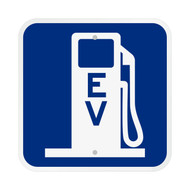What should your company consider before purchasing an EV charging station?
Posted by Meghan McCabe on May 19th 2023
The use and popularity of electric vehicles is growing… but is your business equipped with electric vehicle (EV) charging stations to serve these customers? Before purchasing and installing an EV charging station, we’ve put together a few key factors to take into consideration so you can make the best informed decision for your company.
Charging Infrastructure Needs
- Consider the number of electric vehicles that will charge simultaneously, as this will impact the amount of charging stations you will need, and determine the requirements for charge speed. Once you have a rough idea of your customer’s needs, consider the physical space and electrical infrastructure at your business location.
- Confirm that you have the adequate capacity to support the needed charging stations, and if not, put a plan together to implement an upgrade to your electrical infrastructure. Upon installation, brands like Bosch recommend working with an experienced electrician to install your new charging station, following local electrical codes and regulations.
- Anticipate future growth and demand for EV charging. Ensure ahead of time that your infrastructure can be expanded or upgraded easily to accommodate additional EVs or higher charging speeds.
Changing Station Types/Speeds
- Consider which station type and speed would be best suited for your customers. If your business is open to the public, aiming to cater to the majority of EV’s in your area would be wise.
- JME offers two levels of charging station speeds: level 2 and DC fast changing. It is important to note that the charging speed needed for an electric vehicle is dependent on its own charging capabilities.
Level 2 is the “slower” charging option for EV’s and provides charging through a 240 volt AC plug. This form of charging is sustainable for overnight and longer duration charging. Level 2 is most commonly used in residential and workplace applications, as well as shopping centers and hotels.
JME proudly supplies a variety of level 2 charging stations, including:
DC fast charging also known as level 3 charging, is a rapid charging option and provides a substantial amount of range in a short period of time. DC fast charging stations are most commonly found along highways, rest stops, and high-traffic areas where quick charging is crucial for long distance travel.
JME proudly supplies DC fast charging stations, including:
Network and Software
Consider the network/software features that will best suit your needs, as each EV charging station brand/model boasts different features. Some come with connectivity for remote monitoring, user authentication, payment processing, and data reporting. It is important to remember that some of the features may only work if you have a subscription or connectivity to Wi-Fi.
Software like JuiceNet® (purchased separately for JuiceBox® charging units) features can only be enabled when the charging station has access to Wi-Fi. Non-connected stations with JuiceNet will still charge EVs but will not have access to full dashboard capabilities.
Protection From Inclement Weather
There are precautions to consider when installing and operating an EV charging station, due to the hazards of inclement weather and moisture. Most charging stations are rated for outdoor use, but it is also good to confirm that they comply with relevant safety standards and regulations before purchasing.
When working with your electrician, ensure that GFCI (Ground Fault Circuit Interrupter) protection is installed for electrical safety. GFCI devices can detect ground faults and provide protection against electrical shocks - which is imperative in wet/damp conditions.
If you live in areas where snow and ice removal are necessary, establish a new plan to keep the charging station and surrounding area clear, safe, and accessible.
Ensure connections have protective enclosures and regularly inspect the charging connectors and ensure they are free from ice and debris for proper connection.
Maintenance and Support
Consider the maintenance and after-market support that may be needed for your EV charging stations. Research the manufacturers reputation for reliability, customer support and design to withstand frequent usage. Other things to factor in include warranty coverage, servicing options, and technical support.
Performing routine maintenance (including cleaning and lubricating connectors) and inspecting the charging station for damage, corrosion, or wear caused by inclement weather, can help to lengthen the life and usability of your EV charging station.
Cost and Budget
In addition to the upfront cost of purchasing and installing your EV charging station, consider any ongoing operational expenses such as electricity, network subscriptions, or maintenance.
Regulatory and Incentive Programs
Consider and research incentive/grant programs for EV charging infrastructure installation that you may be eligible for to help offset costs. These can vary by state/region and may impact the financial viability of your charging station project.
Gilbarco Veeder-Root, manufacturer of Amps2Go, has a helpful tool on their website that allows you to see what federal, state, and county funding that may be available in your area: https://www.gilbarco.com/us/products/ev-chargers/ev-incentives
Check out the large variety of EV charging stations that JME offers!
Disclaimer: please note that these are a few key things to consider when purchasing an EV charging station, but with the ever-changing technology of EV, it is recommended to consult our experienced sales team for further questions and assistance. Please contact us at 800-333-3331 or visit our homepage to chat with us – jmesales.com.


